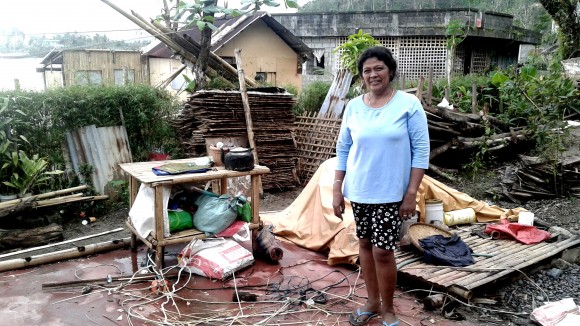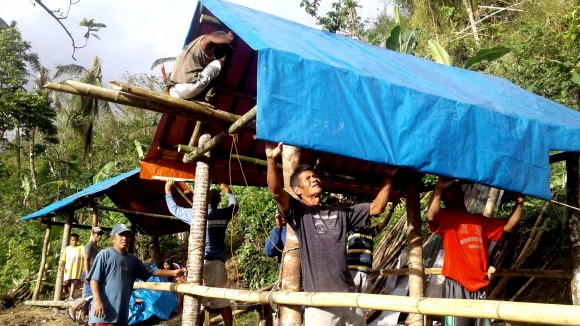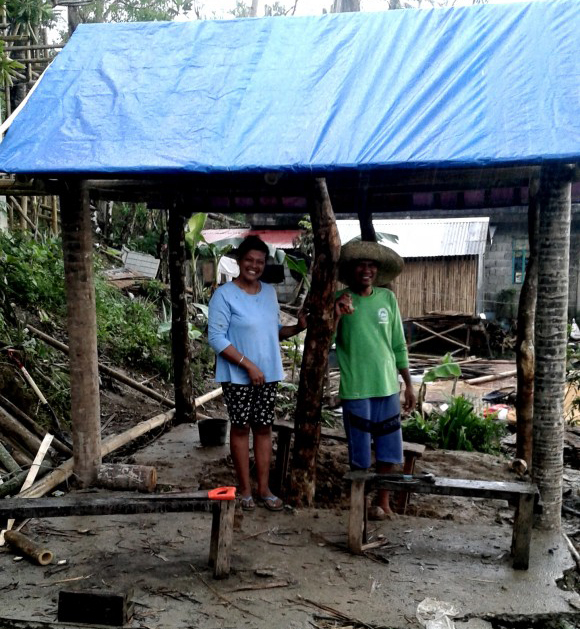Typhoon Nock-ten (Nina) lashed the Philippines on Christmas Day 2016, particularly the province of Catanduanes. Some 400,000 houses were either completely destroyed or heavily damaged. ACTED, in consortium with Action Against Hunger and Handicap International, is providing an integrated emergency for water, hygiene, sanitation and shelter assistance to over 3,200 families people by facilitating distributions of hygiene and shelter repair kits.
1,400 shelter repair kits are being distributed by the teams, while 140 cash for workers are hired to support the repair. This program enables vulnerable populations to work for the community and earn their own incomes. As of end of January 2017, 136 houses were already rebuilt, with many more in perspective. This intervention took place with support from the START Network’s START Fund.
Analyn’s story
Analyn is a strong woman. A widower, she takes care single-handedly of her four children. Her eldest, Malaya, was born 25 years ago with particular needs and Analyn has been taking care of her ever since. Not working as she is by the side of her daughter, it is one of her other children who works as a tindera (waitress) and brings the only income of the family. Living in Bato municipality, where Nock-Ten made first landfall, the typhoon tore apart her house, made of bamboo and nipa, leaving Analyn and her family with only a concrete slab to remind them of their former home.

Working together for Analyn
ACTED responded to Analyn’s dire shelter needs thanks to shelter repair kits. She received tarpaulins, tie wires and all the necessary tools to rebuild her home. Barangay’s (village) authorities and ACTED teams went a step further to support Analyn and many other vulnerable families who cannot fix the house by themselves by hiring cash for workers to help them carrying out the shelter repair works.
In Batalay village, where Analyn resides, the cash for workers were mobilized not only to repair the damaged houses but to help four families rebuild their destroyed houses, under the coordination of Mr. Domingo Mendez, Barangay Captain (a local elected official). ACTED’s cash for workers, with barangay officials, helped rebuild the houses of four single-headed households, who do not have any income, including Analyn’s. The rest of the materials needed to rebuild the houses were difficult to find and expensive, but Barangay officials, carpenters, the house owners, the community worked together to support the most vulnerable families and acquire the necessary equipment.

67 families of the village received shelter kits, four families of which are supported by the cash for workers.
The community supports us as they know that those four families cannot help themselves and need help. Once we are done with those four houses, we will do ‘’Bayanihan’’ (a volunteering day in the village) and help others as well. It is important to help one another.
In the meantime, efforts continue to purchase the remaining needed materials for the walls. One of the priorities now is also to look for a relocation site, as the village is in risky area, prone to floods and landslides, or by the sea.

Efren is one of the cash for workers supporting carpentry activities in this shelter repair intervention. He explains that his usual job is to drive a tricycle, “but I am also Barangay official. The Barangay Captain encouraged to help one another. In total we are three Barangay officials intervening in the cash for work team.”
Efren is happy to support his neighbors:
We need to help one another even if we don’t get paid.
ACTED also provided training to the cash for work team and other willing inhabitants on “build back safer” techniques in order to increase the resilience of the rebuilt houses to the strong winds and rain brought by the recurring typhoons.